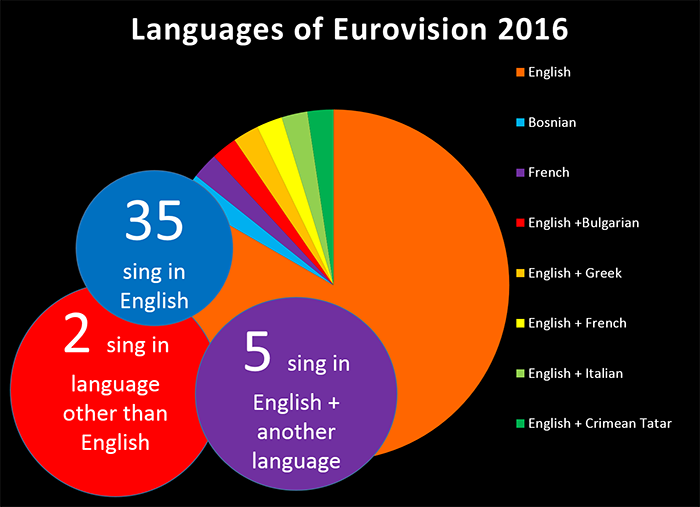Last year we discussed the shrinking number of languages featured in the Eurovision song contest. This year only two countries have entered songs solely in a language other than English.
Singing in English used to be considered an advantage at the Eurovision Song Contest. The country with the most wins, Ireland with seven, and the UK with 5 wins were evidence to this, as is the fact that out of 60 contests 30 have been won by songs in English. What is probably one of the most famous Eurovision winners, ABBA’s Waterloo, was also sung in the English language. Perhaps because of this, the Eurovision rules regarding language have changed on a number of occasions. The final nail in the coffin for language landscape variety at Eurovision came in 1999, when the rules were changed so that countries could compete in any language they wished. Since then every winner, with the exception of Serbia in 2007, has been sung in English.
Of the 42 songs that entered the competition this year, 35 are in English and 5 are sung in both English and another language. Only Bosnia has entered a song in their own language, and Austria have chosen to enter a song in French. The Bosnian entry didn’t qualify for the final, meaning that only one song entirely sung in a language that’s not English will take part in the final.
 35 languages were sung in English, 2 sung in another language than English and 5 sung in English plus another language
35 languages were sung in English, 2 sung in another language than English and 5 sung in English plus another language
Even the countries that have traditionally always sung in their own language have conceded defeat this year: Spain is sending a song entirely in English for the first time. France’s song is sung in both French and English and Italy has submitted a song both in English and Italian. Portugal, who have so far never sung in English, has withdrawn from the competition this year.
There isn’t much hope to hear other languages while the points are awarded either. Last year most of the spokespeople awarding the votes for each country used English. Ironically, it was the UK’s spokesperson, Nigella Lawson, who bucked the trend by delivering the UK votes using German and French as well as English.
Sign language users can rejoice, however, as the broadcast will be available in sign language offered by nine different interpreters.
The contest this year sees Australia return after last year’s supposedly “one-off” appearance and their song has many chances to do well. Russia is the bookies’ favourite, although there is also a lot of support for the Austrian entry and for hosts Sweden. Romania entered the contest but have been forced out of it as its national broadcaster, Televiziunea Română (TVR), owes over €14 million to European Broadcasting Union.
Controversies this year include the replacement of German singer. After Germany originally announced Xavier Naidoo as its representative there were protests about his alleged far-right views and use of homophobic lyrics and he was replaced by Jamie-Lee, a The Voice of Germany finalist known for her animal welfare activism. There were also complaints about the Australian entry as the line "trying to feel your love through face time" appeared to be a reference to FaceTime, the video communication Apple app. However, as it appears spelt as two separate words the song was allowed without the need for a lyric change. A bigger controversy for the contest this year has been caused by the Ukrainian entry. The song is called 1944 and is sung by Jamala, a Crimean Tatar. The lyrics reference Stalin’s deportation of the Crimean ethnic Tatar population, which some argued broke the “no politics” Eurovision rule. Jamala, however, has stated that the lyrics make reference to her family history rather than politics, as her own great-grandmother was one of the many deported.
The big change this year is the way the votes will be announced and cast. In previous years, the votes from national juries have been merged with those of the local tele-voting thus producing the scores that each country awards. This year the scores announced will be those of the national juries only, and the scores from the tele-voting will be added to the total only after the jury scores have been announced. The result of this will be a much more exciting finale, as previous contests have produced winners who got a very early lead and made the final scores announced almost irrelevant. The jury and popular votes can be very different, so the suspense will be kept until the last minute.
Another difference this year is that the show will be live broadcast in the USA for the first time. It will be shown by the Logo channel, which is a cable network aimed at the LGBT community available in nearly 50 million homes. They will be able to see their compatriot Justin Timberlake perform at the event too, as he has been announced as the interval act. He will perform his new single “Can’t Stop the Feeling” live for the first time.





Rate and Review
Rate this article
Review this article
Log into OpenLearn to leave reviews and join in the conversation.
Article reviews